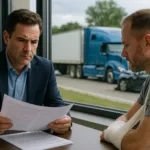A skilled truck accident lawyer helps protect your rights, handles insurers, and fights for the compensation you deserve.
WHY YOU ACTUALLY NEED A LAWYER AFTER A MOTORCYCLE ACCIDENT
Alright, let’s not sugarcoat it—a motorcycle accident? Straight-up brutal. It can turn your world upside down in half a second. We’re talking medical bills that arrive before you’ve even changed out of your hospital gown, pain that keeps you up at night, busted bikes, and a parade of insurance paperwork that seems intentionally impossible to read. Here’s the kicker: insurance folks aren’t waiting by the phone to solve your problems. If anything, they’re trained to hand you the tiniest check possible, slap you on the back, and hope you just go away. If you’re riding a motorcycle, you’re wearing a paper-thin shield, putting you way more at risk for serious injuries than your usual car driver with a metal fortress around them. So, if you think you can just “wing it” through the legal madness after a crash—nah, don’t even try. Having a savvy motorcycle accident lawyer on your side? That’s the move that can change everything, trust me.
COMMON CHALLENGES MOTORCYCLE ACCIDENT VICTIMS FACE
Let’s get into the gritty details, because it’s never just about “fixing a bike and moving on.” Here’s what trips people up:
- 🛡️ Unfair blame is a classic. The stereotype is real—insurance adjusters and sometimes even the police will assume you’re Evel Knievel, out there causing chaos.
- 💰 The first settlement they dangle in front of you? Pathetically low. Insurers are counting on you being desperate or just clueless.
- 📑 Legal paperwork is its own twisted language. Filling out claims, chasing down reports, getting medical records straight—it’s a full-time job and a half.
- ⚖️ Proving negligence sounds simple…until you’re stuck trying to reconstruct the whole event with only your cracked helmet and a half-angry witness who was barely looking.
HOW A MOTORCYCLE ACCIDENT LAWYER CAN ACTUALLY HELP
COLLECTING EVIDENCE AND BUILDING A STRONG CASE
Now, here’s where a real-deal lawyer shines. They basically turn into Sherlock Holmes for you. Gathering accident scene photos, pulling traffic cam footage, tracking down cops for reports, and coaxing witnesses to give statements. Plus, they’re on the hunt for your medical records and bring in crash experts to explain in court why it wasn’t your fault.
NEGOTIATING WITH INSURANCE COMPANIES
Dealing with insurance adjusters is like trying to outbluff a poker champ—they’ve seen every trick. On your own? You’re toast. With a lawyer? Whole different game. They’ll figure out what your claim’s really worth, stop the bullying, and if the insurance company refuses to play fair, they’ll take it all the way to court.
SECURING FULL COMPENSATION
There’s more to your case than just paying off the ER. A lawyer goes after everything: medical bills, ongoing rehab that insurance “forgot,” missed paychecks, future earnings if you can’t work, the cost of fixing your bike, and compensation for the stress and trauma you’re left with.
REPRESENTING YOU IN COURT
Sometimes the insurance companies dig in their heels and won’t budge. That’s when your lawyer steps up: files a lawsuit, walks into court with stacks of evidence, and puts your case out there for a judge and jury. They’re fighting tooth and nail for you, pushing for max compensation.
WHEN TO HIRE A MOTORCYCLE ACCIDENT LAWYER
Short answer? ASAP. If you walked away from the crash pretty wrecked—serious injuries, huge bills, or if the insurance company shows up acting shady—don’t wait. If the other driver is dodging blame or suddenly “doesn’t remember” what happened, that’s lawyer time. Anytime there’s a big fight about fault, make the call.
TO WRAP IT UP
Look—the aftermath of a motorcycle accident is no place to try playing solo lawyer. The insurance people aren’t your pals and they definitely don’t care about your pain or your bills. If you want to make sure you’re treated fairly, protected, and actually get the money you need to put your life back together, reach out to a lawyer—yesterday. Don’t hand those companies a win. Stand up for yourself and get the help you need. It actually makes all the difference.





